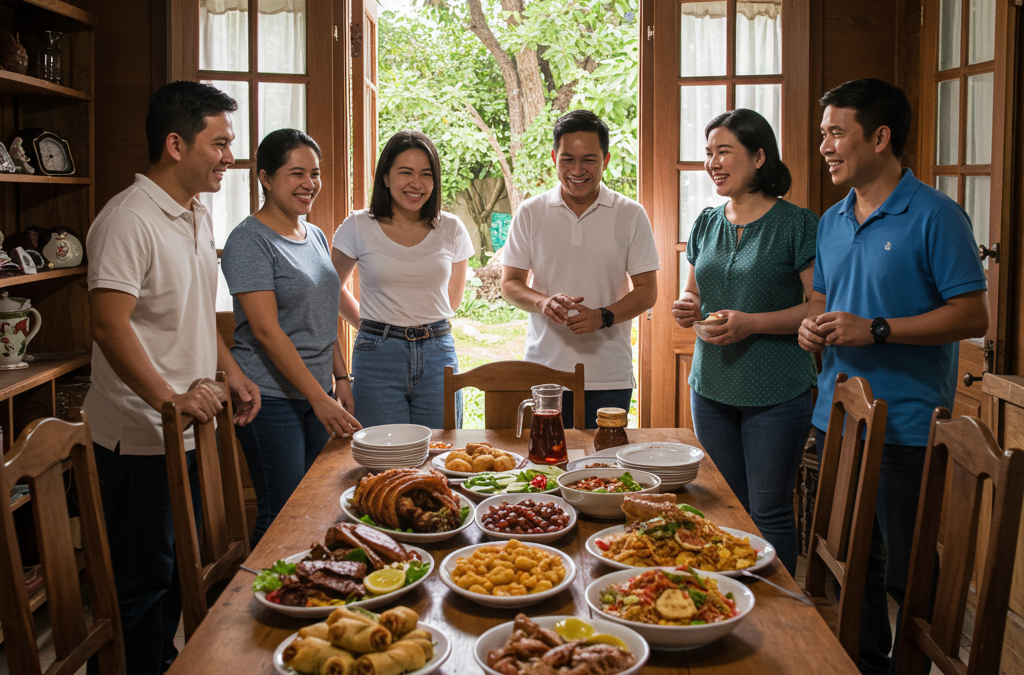Beyond the breathtaking coastlines, the vibrant festivals, and the rich tapestry of cultures, the Philippines possesses a quality that many who have experienced it describe as truly unforgettable: the exceptional warmth and kindness of its people. Filipino hospitality is not merely a polite custom or a quality reserved for guests; it is a deeply ingrained way of life, a reflection of core community values, and an innate desire to embrace others and make them feel genuinely at home. This spirit is often cited as one of the finest welcomes one can receive anywhere in the world.
At the very heart of Filipino hospitality lies the concept of Bayanihan. This term, traditionally referring to neighbors helping a family move their house by lifting it on bamboo poles, has evolved to embody the spirit of communal unity, mutual assistance, and collective effort for the common good. It is a sense of togetherness and shared responsibility that extends beyond immediate family, fostering a culture where caring for one another, even strangers, is a natural inclination. This inherent desire to help and support is the foundation upon which the remarkable acts of Filipino hospitality are built. It is an attitude of genuine care and connection that individuals carry into their daily interactions, creating a palpable sense of warmth that visitors immediately feel.
Nowhere is this hospitality more evident, perhaps, than through the offering of food. In Filipino culture, food is inextricably linked with welcome and care. Stepping into a Filipino home, whether expected or not, almost guarantees being offered a meal or at least a snack and a drink. Hosts often prepare generous amounts of food, insisting that guests eat, take seconds, and feel completely at ease. Stories abound of families of modest means presenting a feast to visitors, sharing the best of what they have, sometimes even going beyond their comfortable means, simply to ensure their guests feel honored and cherished. This act is not about display or seeking reciprocation; it is a genuine expression of generosity and a fundamental way of showing care and making someone feel like family. The shared meal becomes a moment of connection, a tangible symbol of acceptance and warmth.
The openness extends beyond the dining table to the very doors of Filipino homes. It is often said, “Kapag may bisita, bukas ang bahay” (When there’s a guest, the house is open). This saying reflects a cultural inclination towards welcoming visitors, sometimes even unexpected ones, with grace and accommodation. Numerous accounts from travelers and returning expatriates describe being welcomed into homes with open arms, offered a place to rest, share stories, and feel part of the household, regardless of prior acquaintance, social standing, or background. This openness creates a feeling of safety and belonging that is deeply moving, transforming a visitor into a temporary member of the community or family.
Furthermore, Filipino hospitality is not confined within the geographical borders of the Philippines. It is a quality that travels with its people, particularly with the millions of Overseas Filipino Workers (OFWs) and those who have settled in communities abroad. In cities and towns around the world, Filipino homes often become centers of warmth and welcome for fellow Filipinos and non-Filipinos alike. Potlucks, community gatherings, shared celebrations of Filipino culture, and informal support networks demonstrate how the spirit of Bayanihan and the practice of open-hearted hospitality are recreated and sustained across distances. These communities abroad foster a strong sense of identity and belonging, providing a taste of home and a welcoming embrace for newcomers, effectively bridging the gap between the homeland and the diaspora.
Real-life stories frequently highlight the extraordinary nature of this hospitality. One might hear of a tourist, stranded in a remote provincial town, being spontaneously offered a free ride, invited for a meal, and even provided accommodation by a local family they had just met. During times of natural disaster, when communities face immense loss, neighbors consistently embody Bayanihan by sharing scarce resources – food, water, clothing, and shelter – supporting each other through collective resilience and generosity. Simple acts of kindness are commonplace: a street vendor giving back extra change, stating it felt like a blessing to share, or a stranger offering directions and perhaps even walking someone to their destination to ensure they do not get lost. These are not isolated incidents but recurring threads in the narrative of daily Filipino life that showcase hospitality in its most genuine, unassuming form.
In a modern, fast-paced world that sometimes feels increasingly individualistic and disconnected, the enduring strength of Filipino hospitality serves as a powerful reminder of the importance of human connection, empathy, and generosity. It demonstrates that building bridges between people does not always require grand gestures but can be achieved through consistent, small acts of care, openness, and kindness that uplift individuals and strengthen the fabric of communities.
Whether one is a first-time visitor stepping onto Philippine soil, a seasoned traveler returning to explore more, or a balikbayan coming home to reconnect with roots, the warmth of Filipino hospitality is a palpable force that meets you. It is present in the ready smile of a stranger, the insistent offer of a shared meal, the helpful hand extended without expectation of reward, and the feeling of being welcomed not just as a guest, but as part of the family. Because in the Philippines, hospitality is truly more than just a custom; it is a fundamental, heartfelt way of life that leaves a lasting impression on all who are fortunate enough to experience it. The Filipino welcome, warm and genuine, awaits you.


Recent Comments